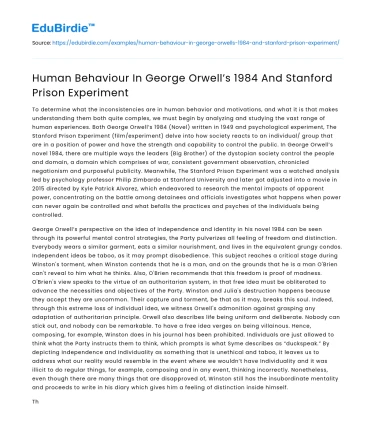Introduction
Human behavior, a complex interplay of psychological, social, and environmental factors, has been a focal point of many scholarly explorations. George Orwell's dystopian novel, 1984, and the infamous Stanford Prison Experiment conducted by Philip Zimbardo in 1971, offer compelling insights into the malleability of human behavior under oppressive regimes and controlled environments. Orwell's narrative illustrates the extent of behavioral manipulation through surveillance and propaganda, while Zimbardo's experiment reveals the rapid transformation of personality under systemic power dynamics. Both works underscore the susceptibility of individuals to external influences, raising profound questions about free will, authority, and morality. This essay seeks to unravel the psychological mechanisms driving human behavior in these contexts, providing a comparative analysis that integrates literary critique and psychological theory.
Surveillance and Control in Orwell's 1984
Orwell’s 1984 delves into the psyche of a society under constant surveillance, where individual autonomy is systematically eroded by the omnipresent Party. The novel's protagonist, Winston Smith, epitomizes the struggle for personal freedom amidst an environment engineered for control. Orwell demonstrates how pervasive surveillance and psychological manipulation can fundamentally alter human behavior, as illustrated by the Party's use of "Newspeak" to limit thought and "doublethink" to enforce cognitive dissonance. According to Orwell, “Big Brother is watching you” is not merely an assertion of authority but a psychological weapon that instills paranoia and compliance (Orwell, 1949). Scholars have argued that such surveillance leads to what Foucault termed the "panopticon effect," where individuals regulate their behavior due to the belief that they are always being watched (Foucault, 1977). This effect mirrors modern concerns about privacy in the digital age, where the boundaries between public and private spheres are increasingly blurred. Critics, however, posit that Orwell’s depiction is hyperbolic, suggesting that human resilience and the inherent desire for autonomy can resist such pervasive control. Yet, the novel remains a potent reminder of the potential for systemic abuse of power to alter human behavior fundamentally.
Save your time!
We can take care of your essay
- Proper editing and formatting
- Free revision, title page, and bibliography
- Flexible prices and money-back guarantee
The Psychological Impact of the Stanford Prison Experiment
In contrast to Orwell’s fictional narrative, the Stanford Prison Experiment provides an empirical investigation into the effects of situational variables on behavior. Zimbardo’s experiment demonstrated how ordinary individuals could exhibit extreme behaviors when placed in positions of authority or subjugation. Within days, participants assigned to the role of guards adopted authoritarian behaviors, while those designated as prisoners became passive and despondent. Zimbardo concluded that the prison environment facilitated deindividuation, where anonymity and group identity diminished personal accountability (Zimbardo, 1971). This phenomenon aligns with the social identity theory, which posits that individuals conform to the norms of their assigned social roles (Tajfel & Turner, 1979). Despite its insights, the experiment has faced criticism for ethical breaches and methodological flaws, with some arguing that participants were merely acting in accordance with perceived expectations rather than genuinely internalizing their roles. Nevertheless, the experiment underscores the malleability of human behavior under systemic pressures, resonating with Orwell's themes of authority and compliance.
Comparative Analysis and Counterarguments
While both 1984 and the Stanford Prison Experiment explore the susceptibility of human behavior to external control, they do so through different lenses—Orwell through a fictional narrative and Zimbardo through empirical research. The former provides a cautionary tale of totalitarianism's dehumanizing effects, while the latter offers a real-world illustration of power dynamics. Critics may argue that Orwell's dystopian vision overestimates the power of surveillance, given historical examples of resistance movements that have successfully challenged oppressive regimes. Similarly, detractors of the Stanford Prison Experiment point to its artificial setting and ethical issues, questioning the generalizability of its findings to real-world contexts. However, both works highlight the thin veneer of civility that can be easily disrupted under certain conditions. They serve as a reminder of the potential for systems of power to exploit human vulnerabilities, emphasizing the need for ethical governance and psychological resilience.
Conclusion
In conclusion, George Orwell’s 1984 and the Stanford Prison Experiment provide profound insights into human behavior and the influence of authority and surveillance. Both highlight the fragility of personal autonomy under systemic pressures, challenging readers and scholars to reflect on the ethical implications of power dynamics. While criticisms exist regarding their applicability and realism, the core message remains pertinent: the need for vigilance against the erosion of individual freedoms and the ethical responsibility of those in power. As society grapples with technological advancements and evolving norms, these narratives serve as timeless reminders of the enduring struggle between control and autonomy in the human experience.






 Stuck on your essay?
Stuck on your essay?

